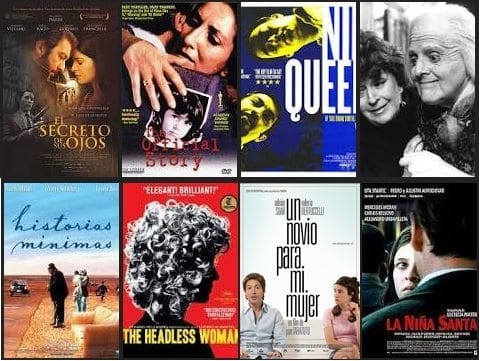Stemming from a conversation we had at Vamos Spanish, we got curious and decided to conduct a little survey among our staff on various topics of Argentine culture, to find out what the Top 3 preferences are for each of them. Given the small sample, it is by no means a representation of the general public opinion; nevertheless, this could serve as a recommendation and a starting point for those who are interested in exploring different aspects of the Argentine culture. In this first Top 3 series, we are going to talk about Argentine Movies!
When it comes to international films, Argentina might not be high on someone’s list. However, do you know that among the Latin American countries, Argentina has one of the most established movie industries and also is the most prolific in terms of winning awards in the world stage of cinema?
Argentina had started making films since the turn of the century when filming equipment were first introduced and imported from France. Its domestic movie industry began to develop and flourish well into the 70’s. However, while productions didn’t stop, it had been affected greatly due to the harsh censorship during the military dictatorship between 1976 -1983. Most of the movies made during this time were limited to lighthearted comedies to avoid severe repercussions.
After the fall of the dictatorship, artists and filmmakers alike were again free to express themselves and were finally able to release their thoughts and imagination. Subject matters in the movies that were made during this new era were all one way or another some kind of commentary on the political and social situations that the country had been enduring. They were heavy and uncomfortable topics yet necessary to address. And it was these movies, the stories that they told, had caught the international attention.
The first that got the acknowledgement was “La Historia Oficial“ (“The Official Story” 1985) which had won the 58th Academy Awards for Best Foreign Language Film. It was also the first Oscar for Argentina. Since then, Argentina has never stopped make provoking thoughtful movies. Works from Argentine filmmakers are nominated often and compete in many prestigious film awards.
To highlight a few achievements to date, Argentina has received Golden Palm nominations at Cannes a few times: “La Niña Santa” (“The Holy Girl”) in 2004, “La Mujer Sin Cabeza” (“The Headless Woman”) and “Leonera” in 2008. Argentina is also the country that has won the most, 14 times to be exact, at the Goya Awards for Best Spanish Language Foreign Film (Goya Awards is considered to be the Oscar in the Spanish-speaking world). Lastly, Argentina is the only Latin American country that has won (not to mention twice!) an Academy Award for Best Foreign Language Film. One was mentioned above and the latest one was “El Secreto de Sus Ojos” (“The Secret in Their Eyes” 2009).
All awards aside, you just have to check them out and judge for yourself. After some meticulous tallying (together with some friendly arguing) here are our preferences. They are popular enough that you should be able to find them easily.
Vamos Spanish Top 3 on Argentine movies:
1) Esperando La Carroza 1 (“Waiting for the Hearse” 1985. The whole movie is on Youtube here. No subtitle though, time to practice your Spanish!)
2) Un Novio Para Mi Mujer (“A Boyfriend for My Wife” 2008)
3) El Secreto de Sus Ojos (“The Secret in Their Eyes” 2009)
Other Runner Ups that worth mentioning are:
– Historias Minimas (“Intimate Stories” 2002)
– Nueve Reinas (“Nine Queens” 2000. The script of this movie was adapted into a Hollywood movie called “Criminal” in 2004.)
– Medianeras (2011. A favorite in the Indie film festival circuits.)
– Elefante Blanco (“White Elephant” 2012. It was one of Un Certain Regard selection at 2012 Cannes.)
Vamos Spanish
Google+




